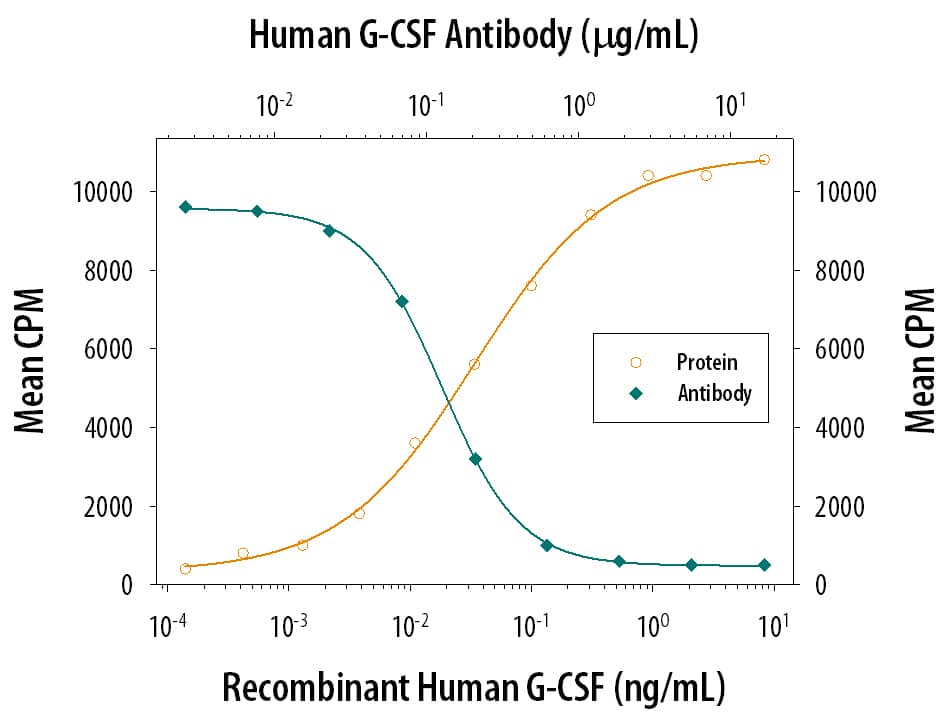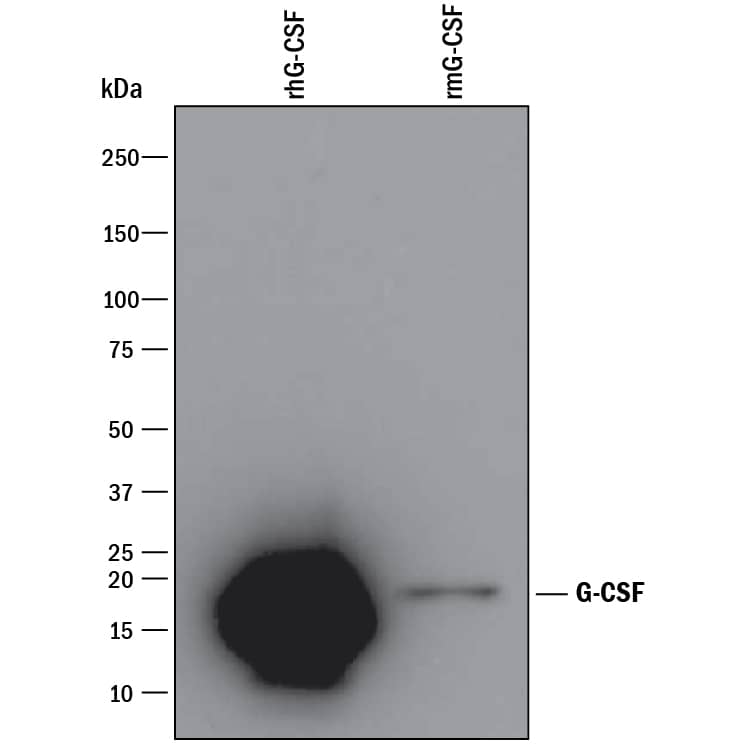Human G-CSF Antibody
R&D Systems, part of Bio-Techne | Catalog # AB-214-NA

Key Product Details
Species Reactivity
Validated:
Cited:
Applications
Validated:
Cited:
Label
Antibody Source
Product Specifications
Immunogen
Thr31-Pro204
Accession # NP_757373
Specificity
Clonality
Host
Isotype
Endotoxin Level
Scientific Data Images for Human G-CSF Antibody
Detection of Recombinant Human and Mouse G‑CSF by Western Blot.
Western blot shows 25 ng of Recombinant Human G-CSF (Catalog # 214-CS) and Recombinant Mouse G-CSF (Catalog # 414-CS). PVDF Membrane was probed with 1 µg/mL of Goat Anti-Human G-CSF Polyclonal Antibody (Catalog # AB-214-NA) followed by HRP-conjugated Anti-Goat IgG Secondary Antibody (Catalog # HAF109). A specific band was detected for G-CSF at approximately 15-20 kDa (as indicated). This experiment was conducted under reducing conditions and using Immunoblot Buffer Group 3.Cell Proliferation Induced by G‑CSF and Neutralization by Human G‑CSF Antibody.
Recombinant Human G-CSF (Catalog # 214-CS) stimulates proliferation in the NFS60 mouse myeloid cell line in a dose-dependent manner (orange line). Proliferation elicited by Recombinant Human G-CSF (0.125 ng/mL) is neutralized (green line) by increasing concentrations of Human G-CSF Polyclonal Antibody (Catalog # AB-214-NA). The ND50 is typically 0.1-0.3 µg/mL.Applications for Human G-CSF Antibody
Western Blot
Sample: Recombinant Human G-CSF (Catalog # 214-CS)
Neutralization
Formulation, Preparation, and Storage
Purification
Reconstitution
Formulation
Shipping
Stability & Storage
- 12 months from date of receipt, -20 to -70 °C as supplied.
- 1 month, 2 to 8 °C under sterile conditions after reconstitution.
- 6 months, -20 to -70 °C under sterile conditions after reconstitution.
Background: G-CSF
G-CSF is a pleiotropic cytokine best known for its specific effects on the proliferation, differentiation, and activation of hematopoietic cells of the neutrophilic granulocyte lineage. It is produced mainly by monocytes and macrophages upon activation by endotoxin, TNF-alpha and IFN-gamma. Other cell types including fibroblasts, endothelial cells, astrocytes and bone marrow stromal cells can also secrete G-CSF after LPS, IL-1 or TNF-alpha activation. In addition, various carcinoma cell lines and myeloblastic leukemia cells can express G-CSF constitutively.
In humans, two distinct cDNA clones for G-CSF, encoding 207 and 204 amino acid precursor proteins, have been isolated. Both proteins have a 30 amino acid signal peptide and have identical amino acid sequences except for a three amino acid insertion (deletion) at the 35th amino acid residue from the N-terminus of the mature protein. Human G-CSF is 73% identical at the amino acid level to murine G-CSF and the two proteins show species cross-reactivity.
In vitro, G-CSF stimulates growth, differentiation and functions of cells from the neutrophil lineage. It also has blast cell growth factor activity and can synergize with IL-3 to shorten the Go period of early hematopoietic progenitors. Consistent with its in vitro functions, G-CSF has been found to play important roles in defense against infection, in inflammation and repair, and in the maintenance of steady state hematopoiesis.
Long Name
Alternate Names
Gene Symbol
UniProt
Additional G-CSF Products
Product Documents for Human G-CSF Antibody
Product Specific Notices for Human G-CSF Antibody
For research use only

